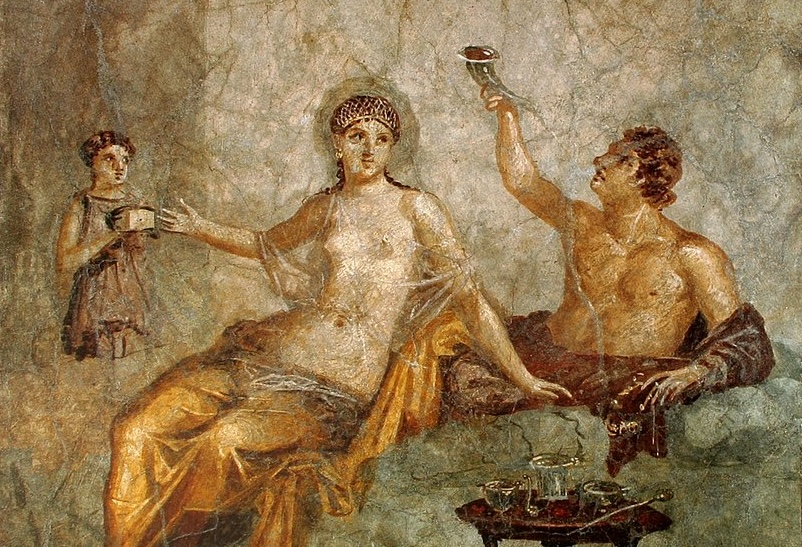Woe to those who are at ease in Zion…
Woe to those who lie on beds of ivory
and lounge on their couches
and eat lambs from the flock
and calves from the stall,
who sing idle songs to the sound of the harp
and like David improvise on instruments of music,
who drink wine from bowls
and anoint themselves with the finest oils
but are not grieved over the ruin of Joseph!Therefore they shall now be the first to go into exile,
and the revelry of the loungers shall pass away.(Amos 6:1,4-7, New Revised Standard Version, Updated Edition)

now at the Naples National Archaelogical Museum. Photo: Yann Forget.
We’ve spoken before about James Nayler and the Lamb’s War.
Nayler, one of the first eminent prophetic voices among Quakers, urged Friends to resist “the whole work and design of the god of this world—his laws, his customs, his fashions, his inventions, and all which seeks to add to or take from the work of God as it was in the beginning.” Christ, the Lamb, comes to “destroy the whole body of sin,” from which the god of this world gains his power over humanity. Many Christians, in the centuries since Nayler laid out his vision, have seen the gross inequalities of colonialism and capitalism reflected in “the whole body of sin.” As such, they view the Lamb’s War as something very much like a class struggle.
For example, Andrew J. Wilkes, a Black socialist pastor in New York City, writes in Plenty Good Room of “confrontational contemplation,” which he describes as “the devotional practice of exposing social evil, engaging in community problem-solving, and undertaking the work of class struggle in order to build a truly beautiful society in which bounty is shared by everyone.” The combination of discernment and direct action resonates quite neatly with my Quaker sensibilities, but I can see how talk of class struggle might make some anxious—especially in the United States, where generations have been taught to regard socialism as barely one step removed from devil worship.
Quakers, in particular, might worry that class struggle drives people apart rather than bringing them together. But Wilkes doesn’t see it as a retaliatory strike against wealthy individuals. Instead, he writes of “a shared striving by working people to co-create organizations, public goods, and social wealth to ensure our own survival and to uplift our collective quality of life.”
For some Christians, however, socialism doesn’t strike hard enough against Empire.
Black theologian Terry J. Stokes, the author of Jesus and the Abolitionists, believes that Christianity “necessarily leads to anarchy.” (The mutual aid sort of anarchy, not the bomb throwing kind.) “The ethical teachings of Jesus—namely, nonviolence, cooperation, and love,” he says, “demand the immediate renunciation of the inherently violent and domineering state, as well as the construction of something else in its place.”
In some ways, we might even view the basic terms of God’s covenant—love God, and love your neighbor as yourself—as an anarchist compact. But what about all the other rules and regulations, you might ask? Some might explain them as a road map meant to help people absorb those two fundamental principles until they become fully absorbed in the consciousness. In this way, as Nayler put it, “God may rule wholly in the hearts of men, and men may wholly live in the work of God.”
Stokes, I think, would also see this as the proper state of things, as “we were not meant to become familiar with love only to then choose supremacy.” And yet here we find ourselves, in a world where a handful of people lord it over others, hoarding their wealth so they can live at ease in a metaphorical Zion. When you read Amos, you can understand why oligarchs fear class struggle, because he does make it sound very targeted and very personal. No wonder they want to discourage people from even dreaming of upending their status quo.
But “the Lamb does not change,” Nayler tells us, “nor conform to the world or the will of any creature.”
Confrontational contemplation forces us to recognize the sinful foundations of the dominant culture—and to acknowledge the extent to which we have participated in it. For the Midwestern essayist Phil Christman, as with Wilkes and Stokes, that realization leads down a particular political path—and so he’s provocatively titled his latest book Why Christians Should Be Leftists.
He gives both sides of that proposition equal weight. “Every person—including a class enemy, for example, or a landlord, or a soldier in an imperialist army—is an image-bearer of God,” he writes. “In our resistance to class oppression, exploitation, and imperialism we are never allowed to forget this.”
More importantly, Christman cautions, “holding left convictions, like holding Christian convictions, doesn’t automatically make you a good person.” Political ideals, like Quaker testimonies, mean nothing if we don’t take concrete steps toward creating communities where even the thought of some living at ease while others live in poverty becomes intolerable. We won’t accomplish this by putting the billionaires up against the wall come the revolution, which would only make us as corrupt as them. We win by breaking down what Nayler called the “spiritual wickedness, exalted in the hearts of men and women, where God alone should be.”



Such an important essay! Especially for today. Thank you for writing this. It expresses the Quaker dilemma for change and class struggle very well and very balanced. I am sharing with